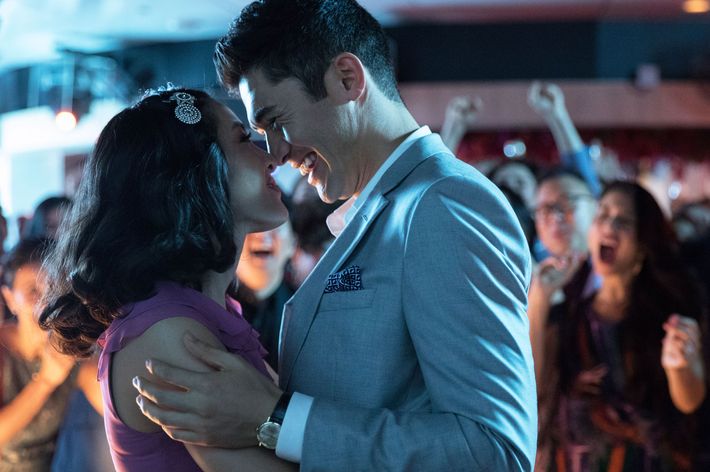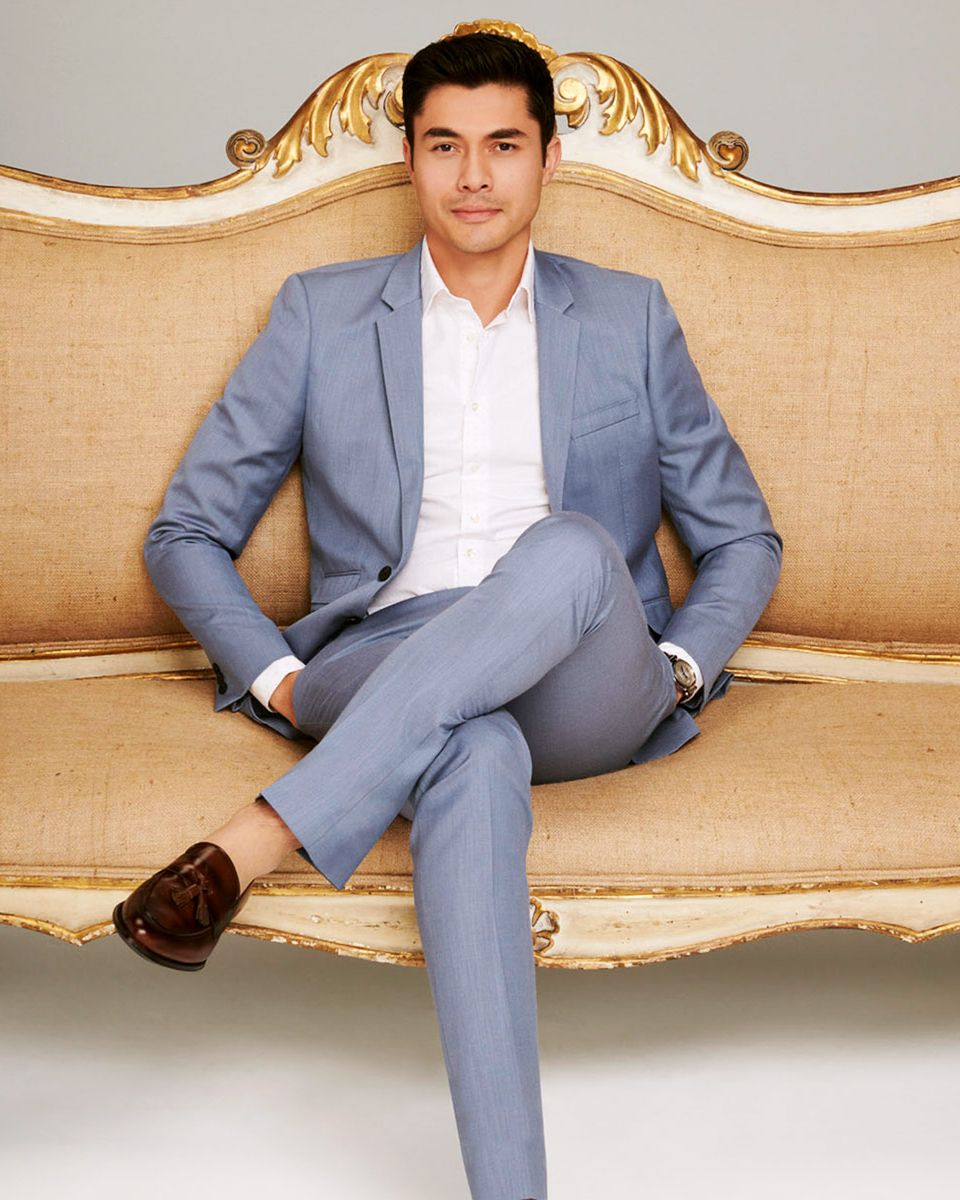It’s a stifling July afternoon in New York, and astonishingly, we’re heading back outside. Moments earlier, Henry Golding and I were standing in the well air-conditioned dining room of the Ladurée in Soho, surrounded by pyramids of pastel macarons. The host offers us a corner table, but Golding declines without ever saying no. “Should we go outside?” he suggests. Our host follows his gaze reluctantly. There are no seats, he says, because the patio had been rained out earlier that morning. “We’ll go to the bar then,” Golding replies cheerfully, steering us toward two pistachio-colored stools under an awning. The air is soggy, like a half-boiled soup, but Golding, dressed in gray jeans and a polo, is neat and crisp, as though he had been cut out from a travel magazine. He looks, well, like a movie star.
It’s a bet that Hollywood is going all-in on. For the past decade, Golding has been on television, not as an actor, but as a presenter and travel host for the BBC and Discovery Channel, trekking through the fairy chimneys of Cappadocia, up the Mekong, and through the mountains of Malaysia. He’s the guide who can take you someplace you haven’t been before and make it feel accessible and faraway all at the same time. Despite his lack of professional Hollywood credits, Golding is the leading man of three upcoming films: First, as Nicholas Young in Jon M. Chu’s Crazy Rich Asians, an adaptation of the best-selling novel by Kevin Kwan; then as the alluring and morally ambiguous husband in Paul Feig’s thriller A Simple Favor, where he pings between love interests Blake Lively and Anna Kendrick; and finally, as a gay Vietnamese man returning to the motherland in the independent film Monsoon, by Lilting director Hong Khaou.
“Henry is just a superstar,” says Kwan, who is also an executive producer on Crazy Rich Asians. “He’s a leading man three times over without the first movie even coming out yet, and it’s a testament to his talent. People just fall in love with him.” Feig also felt Golding’s charms from first sight. In A Simple Favor, Golding plays Sean Townsend, Blake Lively’s impossibly New York novelist husband. He first appears on the screen in a swoosh of magnetically charged air, disarming mommy-blogger Stephanie (Anna Kendrick) with a glance. “I had the same reaction to him that Stephanie would have in the movie,” Feig recalls. “You see him, he’s gorgeous. Then you talk to him, and he has this amazing voice that’s so cool and refined.” He adds, “Henry Golding is a movie star that I have not seen in a long time. That’s like catnip for me, because I can bring somebody new [to audiences], but I’m clearly riding on the coattails of Jon [the Crazy Rich Asians director].”
Finding Henry Golding had been the challenge. Jon M. Chu and the rest of the production team had locked in much of the principal cast of Crazy Rich Asians by the fall of 2016, including Fresh Off the Boat star Constance Wu as the protagonist, Rachel, Awkwafina as Peik Lin (Rachel’s best friend), and Michelle Yeoh as Eleanor Young, Nick’s mother. But they couldn’t find the right Nicholas Young, the self-assured, “much more of a Harry” son of Singaporean scions. He had to be suave and debonair, with a “JFK Jr.” appeal — both relatable and aspirational. There were practical concerns, too: Their Nick needed to nail a British accent, and be telegenically gorgeous, of course.
“I was very frustrated because I felt like our casting was lazy in the beginning,” says Chu. “We weren’t digging up people I’ve never seen. It’s a systematic problem: there are the casting directors who are only aware of ten Asian male actors out there that they go to. When you see the same ten people, you don’t get to discover new people.” Chu broadened the search and put more of their already modest $30 million budget into casting, going global from the West (the U.S., Canada, the U.K., and Australia) to Asia (Malaysia, Singapore, China) and scouting in theater schools, sports teams, modeling agencies, and on YouTube.
Ultimately, it was Chu’s Asian network that came through: someone knew someone who knew someone. Specifically, one of the accountants on Crazy Rich Asians told their line producer, who was setting up shop in Kuala Lumpur, that she had once seen Golding host an awards event, and that she and her friends were smitten with him. The producer then wrote Chu. “I think I blew it off, because I got so many emails from people who have good-looking Asian male friends that are just good-looking Asian men,” said Chu. “Twenty-four hours later, I just happened to go back to the email and I’m looking at his Instagram and he had these charming little videos of him giving tours, talking about food, talking about cats, and it was mesmerizing.” Chu emerged from his social-media rabbit hole to discover they had a Facebook friend in common — a venture capitalist in California. That friend connected them, Chu had a Skype session with Golding, and then asked him to send him some tapes.
Golding, 31, had just wrapped a grueling series called Surviving Borneo, for the Discovery Channel, where he spent seven weeks doing an Iban rite of manhood known as bejalai. It took him from southern Thailand through the mountains of Bario until he reached Sarawak, his birthplace, where he got a tattoo on his right thigh done in the traditional Iban style (note: painfully), with a needle attached to a bamboo stick that hammers the ink into you. He capped it all off with his wedding to his girlfriend, a TV presenter, fitness instructor, and Instagram star in her own right, Liv Lo.
“That really burnt me out,” Golding says. “I was like, I’ve got to take a little respite, figure out what I really want to do in life.” Acting had always been something he had wanted to do, but never pursued. When Chu reached out, Golding decided to go for it. He recorded some sides for scenes from Crazy Rich Asians and sent them in, but they were too stiff. “He got too serious with his reading,” said Chu. “We asked him to redo it, and the second video was right on target.” Golding remembers, “[Jon] was like, ‘You can do this. We see so much of this character in this role for you, that if you bring who you are as a person, we’re going to nail this.’” Golding took the 16-hour flight from Singapore, where he lives, to Los Angeles, and did a chemistry read with Wu in front of 17 people, including Chu and the rest of the producers. Then he cut short his honeymoon in South Africa to do another screen test. “We’re all hanging on this guy, like, Please be able to say lines,” remembers Chu. “He was able to act. Him and Constance did a little scene together, and there was electricity in the room. It made you want to see the movie.”

Ever since his casting was announced last March, people both in and outside of Hollywood have had their eye on Golding, a rarity in the Hollywood firmament. When Feig was casting for Sean in A Simple Favor, his wife Laurie suggested he look at the Crazy Rich Asians roster because she was a fan of the books, and Feig was specifically looking to cast a nonwhite actor. “I needed somebody who could come on the scene the same way that Blake does: this otherworldly being who’s beautiful and cool and erudite, but then has to slowly be able to fall apart,” said Feig. “He’s got everything you want: You’d believe that he would be married to Blake Lively.” Casting an unknown in a major motion picture is still a risk in a relatively conservative industry. “I’m not going to say I didn’t have to fight for him,” said Feig, “but it was a fight I could win because we had the insurance of these two amazing women [Lively and Kendrick].”
Golding’s role in Crazy Rich Asians also sparked chatter in some corners of the internet that of course they had to cast a half-white guy to play Nick. “It was like, ‘Oh, he got the role because he’s half-white,’” Golding recalls. “But I went through the same loops every other person who read for this went through. There’s no real test of how Asian you need to be to be able to own your Asianness, and it’s always going to be an area of contention.”
Anyway, everything that could be said about it, he has already heard before. Golding was born in Sarawak, Malaysia, and grew up along the eastern peninsula in Terengganu before his family moved to Surrey, just south of London, when he was 8 years old. He moved to Kuala Lumpur when he was 21 to pursue on-camera roles after working as a hairdresser on Sloane Street in London for a couple of years. In just about any context, his background has always prompted that familiarly loaded question: “Where are you from?” Lately, he has an answer at the ready: “I live in Singapore, but I’m east Malaysian, and my father’s English,” he laughs. “That covers all the bases!” including inevitable questions like, “Which parent’s the Asian one?”
Born the youngest of three kids, the move to England was a fraught one. “Coming [in] as an Asian kid in a rural area of England, they’d go after you; there was all sorts of racism,” says Golding. “There was always a struggle with being Asian and not being Asian enough. It’s going to be down to me to own my race. So that’s something I came to be proud of. I feel so much more connected with my Asian side than I do with my British side — of course, I’m proud of my British side. But once you’re secure with yourself, it doesn’t matter who the fuck says whatever. That was a really good realization when I was younger — that set me on a path where I don’t need to follow anyone else to be happy.”
He has a handy metaphor to point to on his body. Golding pulls out his phone and plays a trailer of Surviving Borneo to show me the tattoo on his right thigh. It’s a fig tree that wraps around other trees and takes their form to become the tree itself. There are dragon heads, which, he says, represent “once being lost, but now found.” “It was a sense of finding my identity, being secure and safe in myself,” says Golding. “It all, spookily, came true.”





